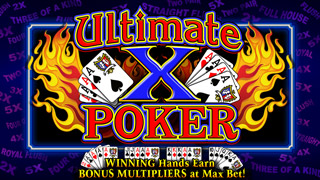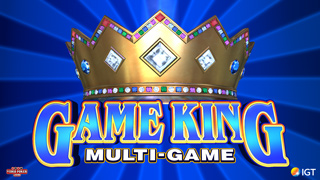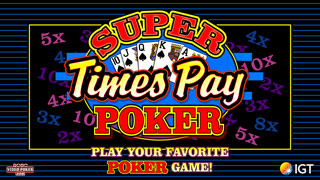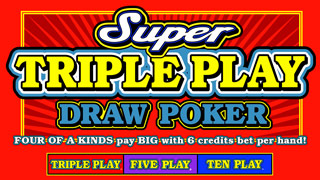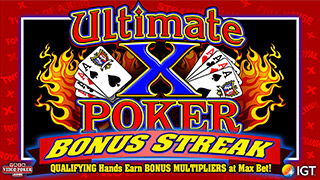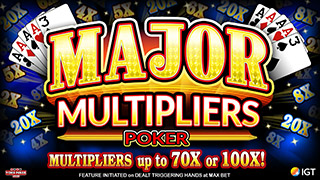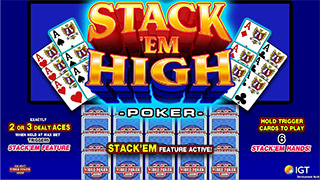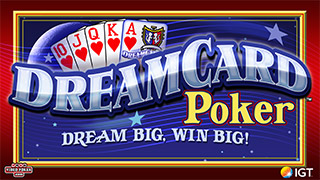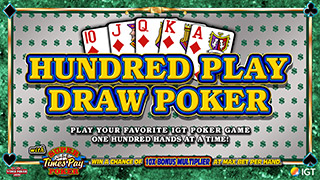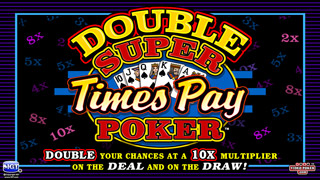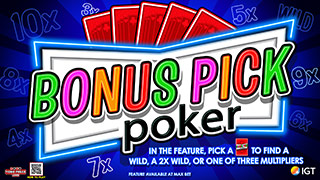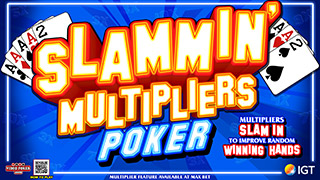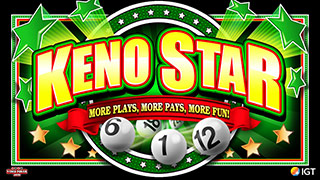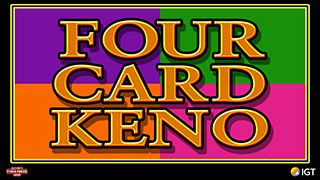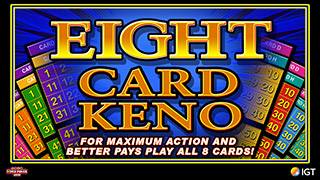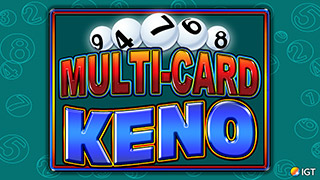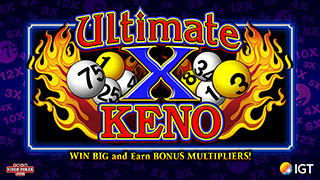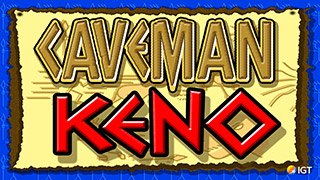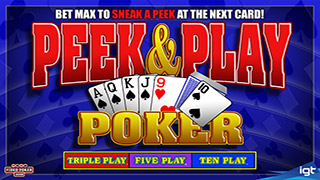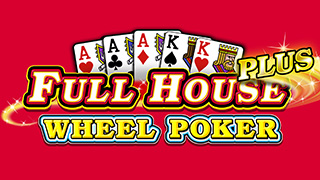Video Poker Team Play
-
New2vp
- Video Poker Master
- Posts: 1882
- Joined: Mon Sep 11, 2006 4:02 am
Video Poker Team Play
In the spirit of recent posts, it has become apparent that it is not enough for casinos to safeguard their video poker profits by simply putting in negative expectation machines.Why? Because a clever group of former advantage players have discovered that team play on negative expectation machines is a way towards certain profitability even if the crafty casinos try, by removing the multi-denominational games, to foil the plots of those who would wish to play RTT or ARTT .How do players profit in spite of these dastardly casino ploys? Well, I'm sure you have heard of the MIT blackjack team, recently memorialized in the movie 21. In these situations, some team members playing low stakes would signal others who played for higher stakes when the deck contained a high enough proportion of ten-count cards (or there was an advantage for the player). Here, the idea is that the probabilities governing later deals at blackjack are dependent on what cards have been removed from the deck. Team play in video poker works in a similar fashion. The players carefully stake out the casino to identify $1, $2, $5, $10 (and sometimes $25) machines that all have the same negative-expectation game (or games, considering that the advanced strategies require switching from a negative Bonus Poker game to a negative Double Double Bonus, Triple Bonus, or Super Double Bonus game). If the players cannot maintain visual contact, they sometimes must employ a non-playing partner to serve as a runner to carry the signals that are crucial to the success of this scheme.How could those playing low stakes know when it is profitable for high-stakes players to play if all the deals on video poker are independent of each other? How can a negative-expectation game suddenly become profitable? Not a problem; RTT and ARTT cover this situation, according to their creator.The team agrees on a pre-set goal after which they will stop playing and leave their machines. So as not to draw attention, they will all leave at different times and meet at a pre-planned destination.Play begins with $1 player. If he is lucky and wins, he pockets the profits for later distribution; sometimes, he may even win the entire goal and the others will not have to play. But sometimes the fates do not cooperate and he goes on a bit of a losing streak. If the player at the $1 machine has lost enough, he cleverly signals the player at the $2 machine that it is time for the $2 man to start playing. Then the $1 player takes a rest by having a drink (his favorite diversion) or asking an attendant to temporarily shut down his machine while he takes a restroom or stretching-his-legs break. Now it is the $2 player's turn. If he hits in time, he will signal the $1 player that it is once again time for him to play. It is crucial that these signals be subtle because these players may be thrown out when the casino discovers that these schemes are essentially robbing them blind. Now, the $2 player knows that if he loses instead, it must be time for the machine of the $5 player to hit.Do you get the idea? Then the $5 player either hits and signals the $1 player to start again or he loses enough so that he knows that the $10 machine is due to hit.When I asked to interview team members, most would not talk to me, but one of them volunteered, on condition of anonymity, to answer my questions. My first question was, "Are you afraid of the consequences of being caught by the casino?" The answer was, "You know, I think a couple casinos know, but they don't seem to be doing anything about it. Maybe they just like bodies in the seats in front of their machines."The other question was, "How could this be a profitable venture?" The answer: "The team is guaranteed either to win or that the losses will be lower than what would be expected if they were all to play their own machines without waiting for the others' signals.""How do you know that?" I queried.He said, "Wake up! These are negative expectation games! Anything that reduces our amount of play is to our advantage!"The above account is fictional, just like some of the other posts on this forum. Any resemblance to real
persons, living or dead is purely coincidental. I would hope it would be clear to all but the most dense that there is really no difference between the team play described above and play by a single person on a multi-denominational game except for the number of players and the cool signals and story. Any bets on which readers will be the ones either (1) not to realize that this is satirical or (2) to question the comparability of team play with multi-denominational play? Either way I'm ready for the inevitable casting of aspersions.
-
Eduardo
- Video Poker Master
- Posts: 2967
- Joined: Thu Aug 31, 2006 7:19 pm
Consider my aspersion cast upon you!
-
cddenver
- Video Poker Master
- Posts: 2269
- Joined: Tue Mar 13, 2007 9:54 pm
He said, "Wake up! These are negative expectation games! Anything that reduces our amount of play is to our advantage!"
That was a nice story.
I did have one question, though. Based on the statement that I've quoted and extending the logic, could one assume that a negative amount of play would lead to a positive return?
-
New2vp
- Video Poker Master
- Posts: 1882
- Joined: Mon Sep 11, 2006 4:02 am
Cd, Things that make you go, "Hmmmm..."
-
New2vp
- Video Poker Master
- Posts: 1882
- Joined: Mon Sep 11, 2006 4:02 am
Consider my aspersion cast upon you!
I guess I lost my bet as to who would cast the first one.
-
shadowman
- Video Poker Master
- Posts: 3587
- Joined: Mon Oct 23, 2006 5:42 pm
Very clever.
A nice way of demonstrating that a progression provides no advantage over single line play. In your example all the team players are playing precisely like the players who are denigrated by Mr. ARTT for playing this way. No single player is playing a progression, yet the actual progession of hands is identical to one player playing a progression.
It makes it very easy for someone to see that there is no difference in real expectation.
A nice way of demonstrating that a progression provides no advantage over single line play. In your example all the team players are playing precisely like the players who are denigrated by Mr. ARTT for playing this way. No single player is playing a progression, yet the actual progession of hands is identical to one player playing a progression.
It makes it very easy for someone to see that there is no difference in real expectation.
-
royal flush
- Video Poker Master
- Posts: 1116
- Joined: Fri Nov 10, 2006 12:50 pm
the bottom line is if the player plays 100%+ games and plays them correctly no one knows when and where "mr. royal will show up" the artt is the road to ruin
-
Eduardo
- Video Poker Master
- Posts: 2967
- Joined: Thu Aug 31, 2006 7:19 pm
I was going to call you an idiot just for fun. But then when i was going through the other short strategy topics look what I posted on February 20th in the other one.
[quote=Eduardo]
A bank of machines where someone is playing dimes slowly
Another person is playing quarters
Another is playing $.50 and then
Someone is playing dollars very quickly
Their rate of play is proportionate to the frequency of your bet amounts in your strategy. Mostly dollars. A dime and a quarter and a 50 much less frequently.
Is this group more likely to win that day, than a group sitting at a bank of machines playing nothing but dollars?
Their wins will each be proportionate to the amount they are betting. The same is true of each hand in your betting strategy. Your expected return will be the number of dimes bet times a dime, plus the number of quarters bet times a quarter, to to dollars. In the end you might as well be playing 74 cent poker or something like that if there were such a thing.
There is no advantage. Or maybe I've just been sitting next to the wrong people. [/quote]
Now I say you are a genius. We should be on a team!
[quote=Eduardo]
A bank of machines where someone is playing dimes slowly
Another person is playing quarters
Another is playing $.50 and then
Someone is playing dollars very quickly
Their rate of play is proportionate to the frequency of your bet amounts in your strategy. Mostly dollars. A dime and a quarter and a 50 much less frequently.
Is this group more likely to win that day, than a group sitting at a bank of machines playing nothing but dollars?
Their wins will each be proportionate to the amount they are betting. The same is true of each hand in your betting strategy. Your expected return will be the number of dimes bet times a dime, plus the number of quarters bet times a quarter, to to dollars. In the end you might as well be playing 74 cent poker or something like that if there were such a thing.
There is no advantage. Or maybe I've just been sitting next to the wrong people. [/quote]
Now I say you are a genius. We should be on a team!
-
New2vp
- Video Poker Master
- Posts: 1882
- Joined: Mon Sep 11, 2006 4:02 am
Eduardo, of course I agree with you; you said the same thing that I did with logic and now that you re-posted I remember your earlier example.S-man also said the same thing earlier with math by using the associative property of arithmetic.I just used the tool of sarcasm (for those who enjoy that more than math) to drive it home...but will we get agreement from those with some college?
-
faygo
- Video Poker Master
- Posts: 2925
- Joined: Tue Jan 09, 2007 6:55 am
I've had some and I agree.



